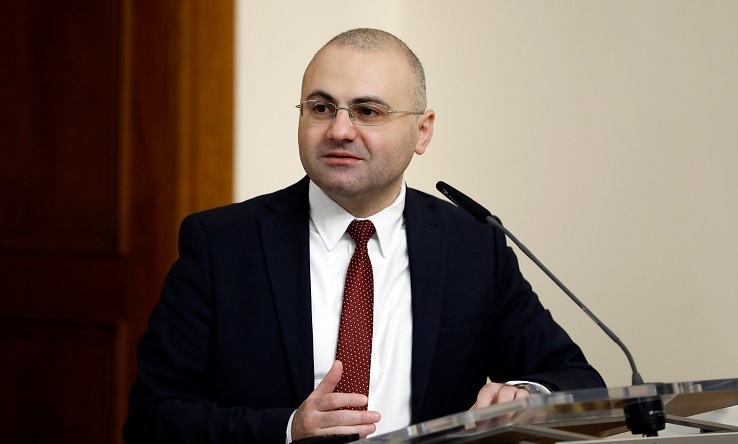Georgia’s Deputy Justice Minister dismisses stigmatisation concerns over Foreign Transparency Law

Beka Dzamashvili said the registry under the law provided a “comprehensive breakdown” of funding. Photo: Justice Ministry press office
Beka Dzamashvili, Georgia’s Deputy Minister of Justice, on Friday rejected concerns of stigmatisation of non-governmental organisations and media outlets in the country through the Law on Transparency of Foreign Influence by saying a registry that caused the concerns called for reflection of “full funding details” of organisations subject to it and not just foreign contributions.
Dzamashvili made the comment in a session of the ongoing Constitutional Court hearings of lawsuits submitted against the law, and said the entry had “no goals of stigmatising” subject groups.
The Court began hearings on Thursday over four lawsuits challenging the law passed by the Parliament in May, which requires non-commercial entities and media outlets in the country to register as “pursuing the interests of a foreign power” if they receive more than 20 percent of their funding from abroad.
Dzamashvili said the registry under the law provided a “comprehensive breakdown” of funding, including both domestic and foreign contributions, and stressed the law aimed to present a “complete picture” of an organisation’s financial sources.
The registry displays the total funding of an organisation, including the percentage from foreign sources”, he said. “This transparency ensures that when someone views the register, they can see not only the foreign funding but also the proportion of Georgian funding. This complete information helps prevent any potential stigma by clarifying the true financial landscape of the organisation”, the official noted.
He also addressed concerns by plaintiffs about the law stigmatising organisations funded from foreign sources, claiming the intent of the transparency requirement was to “provide an objective view rather than create a negative label”.
Tamar Tkeshelashvili, the First Deputy Minister of Justice, told the Court 233 organisations had been registered under the law, adding there were approximately 30,000 organisations across the country including state entities and federations.
She reassured the Court the Public Registry was “committed to assisting organisations” with registration and compliance with the law.
Davit Devidze, the Chairman of the National Public Registry Agency, told the Court some of the groups challenging the law had submitted applications for registration based on the legislative piece, without disclosing their names.
Several claimants have already applied to the Public Registry, seeking registration as organisations pursuing the interests of a foreign power. It is positive and significant that all relevant entities are aware of this”, Devidze said.
The four lawsuits against the law include submissions by President Salome Zourabichvili, 112 NGOs and media organisations, 38 opposition MPs, and two additional media groups. They argue the law infringes on rights to personal development, privacy, and freedom of information and conflicts with Georgia's European and Euro-Atlantic integration goals.
 Tweet
Tweet  Share
Share